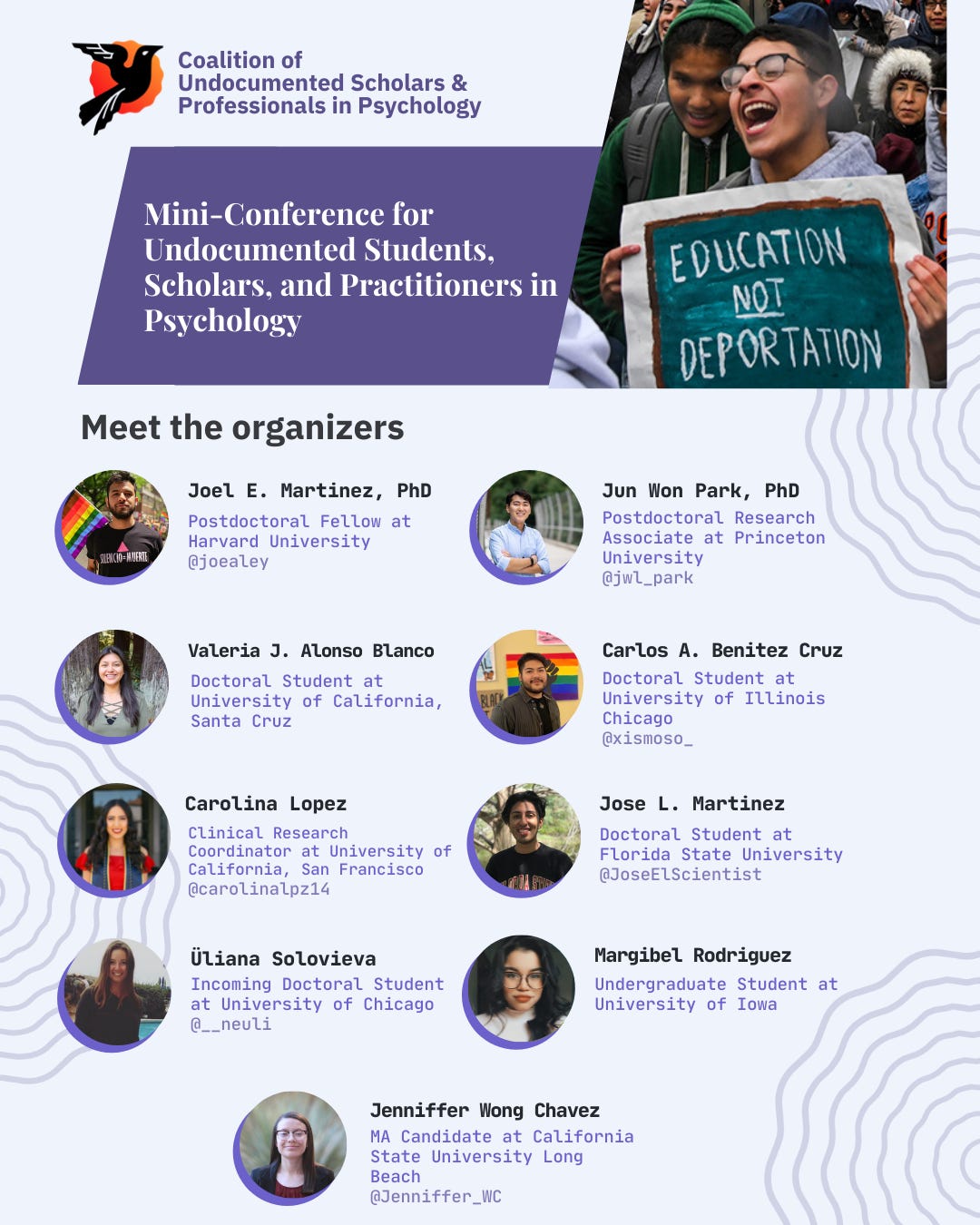Navigating the PhD as an undocumented student in the United States
Our 30th and 31st book winners are Allison Engstrom (incoming PhD student) and Kaelyn Sabree (incoming PhD student)! Be sure to enter the book giveaway for your chance to win a copy of A Field Guide to Grad School! More details below (at the end of the post).
Some important notes about this post: This post was written in collaboration with members from the Coalition of Undocumented Scholars and Professionals in Psychology (CUSPP). CUSPP is designed to bring together undocumented students, scholars, and practitioners interested in or working in all areas of psychology. The group currently includes 10 members from different institutions in the United States. Thus, the information shared will be most applicable to undocumented students in the United States interested in pursuing (social science) PhDs in the United States. If you’d like to bring attention to resources serving undocumented students elsewhere, or would like to add to the information shared here, please email me (Margaret) at: letstalkgradschool@gmail.com. Now onto the important information!
Despite efforts to improve the representation of undocumented students in psychology, undocumented students continue to face a number of challenges (e.g., unfavorable institutional, state, and federal policies). Due to threats associated with public disclosure, many current and prospective undocumented psychologists also face immense challenges connecting with one another. CUSPP hopes to address these challenges and develop one of psychology’s less visible—and highly underserved—communities.
As of 2019, undocumented students account for approximately 2 percent (427,345) of all higher education students in the United States. Of those students, less than half are eligible for DACA (Deferred Action for Childhood Arrivals). For this reason, among others, it’s important to understand how DACA status affects aspects of the PhD process—from application through training and beyond.
For those unfamiliar, DACA refers to President Obama’s 2012 executive action that granted some undocumented youth a reprieve from deportation, the right to work authorization, and semi-lawful presence. Different opportunities and challenges exist for students with and without DACA. For example, students with DACA can obtain work authorization that allows them to become an employee (e.g., apply for jobs, internships, RA/TA positions) and apply for several scholarships and fellowships for which students without DACA are ineligible. In contrast, students without DACA often have to look for alternative ways to find employment (e.g., stipend based, scholarship income), take on volunteer positions, are limited in the number of scholarships for which they’re eligible, and may not be able to leave the country and come back. Additionally, different states and institutions (i.e., private vs. public) vary in the amount of support (from acceptances to funding and teaching opportunities) that they may provide for undocumented students with and without DACA.
Because navigating the PhD process without DACA (compared to having it) is often more restricting, here we (CUSPP members) share some things to consider when applying to social science PhD programs, especially as an undocumented student without DACA:
Where are you willing and able to move? Here, you need to consider whether you are comfortable traveling across states with a Temporary Visitor Driver’s License. These licenses may not be accepted for driving in states other than where you are currently residing. Nor may they always be used for identification. Thus, if moving to another state, you may have issues visiting family and may not be able to fly.
Additionally, you may run into potential housing problems if unable to be on a lease. In these instances, you may need a co-signer or may need to sublet. In some cases you may be unable to do either, and will need to find trusted individuals with whom you can live.
Finally, you will need to consider the political climate of the state you’re living in. Not all states (or even cities) are friendly to undocumented students. It’s very important that you know your rights wherever you are at all times.
Where to apply? Students without DACA will often find more opportunities, funding, and support at private institutions. At public institutions, students without DACA may run into the issue of not being able to be paid if the school hasn’t designated special fellowships or funds to pay them without requiring a social security number. Without a stipend, students without DACA would need to secure funds some other way, which can be very difficult.
Regardless of an institution’s public or private status, be sure to know the answers to the following:
Can you receive a stipend?
Can you teach or TA?
Can you work on federally-funded grants? If not, will that affect your ability to do research?
Can you apply for internal and external grants given your status? Does the institution have fellowships and scholarships that do not consider citizenship status?
Does the institution have lawyers and/or consultants for undocumented students?
Here are some other important questions to consider as well as a guide on how to assess Institutional UndocuCompetence.
Keep in mind that faculty may not know about their institution’s available support for undocumented students. Instead, talk to administrators at your programs of interest. Relatedly, find out more about the undocumented student resource centers (USRC) at the institutions to which you’re applying. Some institutions may even have diversity, equity, and inclusion centers with undocu liaisons. If these resources are available, ask if they provide assistance with the PhD application process and whether they can connect you with other undocumented students at their institution (and ideally in your program of interest).
When to reveal your status and to whom? Being open about your status to administrators and potential advisors could prompt discussions on how you may be supported (or not) as an undocumented student at a particular institution. Some students will also include their undocumented status as part of their narrative in their statement of purpose and/or diversity statement to connect how their identity helps inform their aspirations in research.
How to deal with uncertainty? Take it one step at a time! It can be really hard to plan for the future when policies that protect undocumented students are not guaranteed nor widespread. For example, students with DACA may experience periods during which their status has lapsed. If this happens when teaching, students with a lapsed DACA status may not be able to teach. What happens then depends on the institution. Some institutions may be able to support students with a lapsed status by “buying” them out of teaching. Other institutions may look to the students themselves to figure out their own solution. For this reason and others, it’s very important for you to find and start building your community before you even officially join a program.
Additional resources for undocumented students interested in psychology:
Be on the lookout for different summer (e.g., Yale Internship, McNair, Harvard PPREP) and mentorship (e.g., NPSP, Psychin’ Out, Project SHORT) programs geared toward underserved communities to gain research experience, application information, support, and fee waivers.
Many resources are at mydocumentedlife.org, including this Webinar and Mini Roadmap on applying to and navigating graduate school, and this thoughtful interview with one of our founding members, Joel, on transitioning to a post-doctoral position.
Longer guides: Grad School Decoded: Undocumented Way & Undocu-Grad School Guide and Immigrants Rising.
Presentations on supporting undocumented students from CUSPP and from Harvard.
Guide for applying to graduate school from UndocuPhd organization.
Looking for a way to connect with other undocumented scholars in psychology? Join CUSPP for their first Virtual Mini-Conference for Undocumented Scholars and Practitioners in Psychology!
When: Saturday June, 18th from 9am PT (12pm ET) to 3:30pm PT (6:30pm ET)
Online sessions include:
Networking Meet & Greets: Learn about other undocuPsych journeys.
Research Panels: Present your work and join research discussions.
Professional Development Workshops: Apply to and succeed in grad school.
Community Advocacy: Learn from scholar and community activists.
Register by May 15: https://tinyurl.com/UndocuPsy
Find out more about CUSPP:
Website: https://undocupsy.com
Send us your questions: cusppinfo@gmail.com
Let’s connect: Twitter (@UndocuPsy) and Instagram (@undocupsy)
How to reach me: You are always welcome to email me (letstalkgradschool@gmail.com) or find me on Twitter @tweetsbymidge.
Want to support my #hiddencurriculum efforts? Consider “buying me a coffee” via Ko-fi. All funds will be put back into my Let’s Talk Grad School initiatives (i.e., weekend groups, buying/mailing books, etc.). Learn more about my efforts here.
Let’s give away some books: Readers located in the United States and Canada are eligible to enter the book giveaway to receive a copy of A Field Guide to Grad School by Dr. Jessica Calarco. To do so, complete this survey and note that you only have to complete it once to be entered in all subsequent giveaways! I do hope to expand the reach of the giveaway; however, at the moment, the shipping costs are too great to scale. If you’d like to talk about ways your institution could secure an electronic (or hard) copy, please let me know.
Until next time!
Margaret





